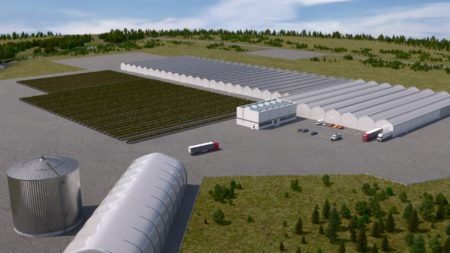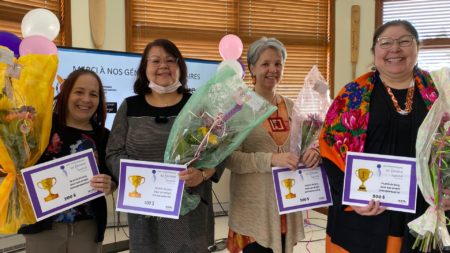An Ultra-Modern Nursery Soon to Be Built in Roberval

L'imposant complexe de 22 serres de la Pépinière Forestière Tshitassinu permettra la production de 10 à 15 millions de plants forestiers chaque année.
In the coming months, a huge complex comprising 22 greenhouses, capable of producing 10 to 15 million forest seedlings per year, will be completed in Roberval. Production will be fully automated, thanks to cutting-edge technologies from around the world, making the Pépinière Forestière Tshitassinu one of the most modern and efficient facilities of its kind in North America. Headed by the Arias family of Mashteuiatsh, this innovative $43 million project receives support from Rio Tinto’s Regional Economic Development.
Ricardo Arias knows the ins and outs of the nursery business. With his former company, he spent 35 years in the forest, planting 75 million trees and helping to reforest thousands of hectares. “When I learned that my two daughters were interested in continuing in the field, we decided to embark on this adventure together,” he said.
With Ricardo, Chloé and Stéphanie Arias as co-owners, Pépinière Forestière Tshitassinu is the first forestry nursery in Canada to be majority-owned by Indigenous women. “For First Nations people, this is a source of pride. Preserving the boreal forest is a legacy to future generations […],” Arias continued. “The land is a treasure that belongs to everyone, Indigenous and non-Indigenous people alike.”
« Le projet de la Pépinière Forestière Tshitassinu rejoint les quatre axes du Développement économique régional (DER) de Rio Tinto qui sont l’innovation aluminium, le 4.0, l’économie circulaire et la décarbonation. Nous nous sommes engagés à être carboneutres en 2050 et à atteindre la moitié de notre objectif en 2030. Soutenir les entreprises du milieu est une façon d’y parvenir », souligne Luc Cyrenne, directeur de projets pour le DER.
The ultra-modern nursery will have state-of-the-art technology for soil preparation, potting, transplanting, classification, plant cooling and packaging of forest seedlings in cardboard boxes. A wide variety of seedlings will be grown year-round, whatever the season.
“The plants will be grown in optimal conditions, which will considerably reduce losses […],” said Arias. “In cold weather, they won’t be outside. We will have a large refrigerator, which we can use to make 14 million plants dormant. Transport will be carried out in refrigerated trucks, allowing us to deliver many more plants while reducing transport costs, not to mention greenhouse gas emissions.”
The Pépinière Forestière Tshitassinu aims to produce over 450 million seedlings over 30 years to reforest 450,00 hectares of boreal forest and absorb over 11.2 million tonnes of CO2.
On top of the environmental and technological benefits, the project has social benefits. It will create 30 jobs, including 20 jobs for women in the Mashteuiatsh Indigenous community. There will also be a daycare centre for 30 children on site.
For the Arias family, Rio Tinto’s support will play a key role in the company’s success. “I thought it was important to have the backing of a large company with the same values as us,” said Chloé and Ricardo Arias. “We live in the same territory. We’re proud that we can count on a multinational like Rio Tinto and work toward a bright future with them at our side.”


